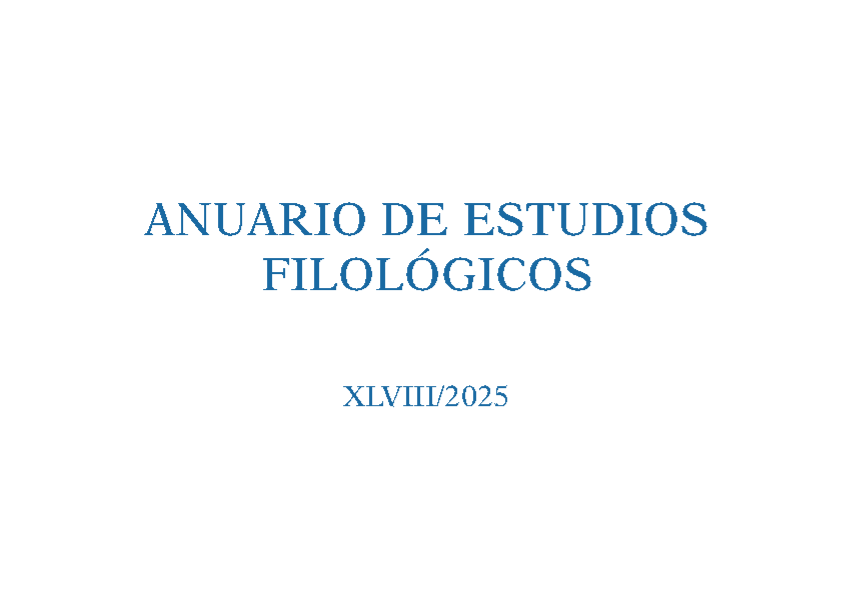Territory and identity in the poetry of Brazilian indegenous women
DOI:
https://doi.org/10.17398/2660-7301.48.49Keywords:
Literature in Portuguese, Brazil, Indegenous poetry, Territory, IdentityAbstract
Poetry written in Portuguese by Brazilian indigenous women is a recent literary phenomenon whose role is proving fundamental in the construction of a common indigenous identity. In this article we aim to analyze the relationships that the authors, settled mostly in large cities, establish between contemporary indigenous identity and the territories where they live. The methodology used is qualitative. Thus, starting from a representative sample of poetry written by these women, we selected the poems in which the relationships between identity and the territory about which these poets write are most clearly reflected. After its analysis, it has been possible to appreciate how these relationships are configured around two central ideas: the rootedness and the uprooting of the poetic subject with respect to her territory, both real and imaginary. The research carried out allows us to conclude that, for indigenous women authors, poetry is a banner in their identity claims against the state and society. However, the fact that the ancestral territory of their ancestors is not present leads them to a construction of their indigenous identity that is detached from that territory and from the urban physical space in which they live.
Downloads
References
BRAGATO, Fernanda (2022): «Os direitos indígenas na Constituição Brasileira de 1988: da conquista aos atuais retrocessos». Revista de Estudos Constitucionais, Hermenêutica e Teoria do Direito, 14.3, 439-463 (https://doi.org/10.4013/rechtd.2022.143.09).
COSTA, Heliene (2020): Identidades y Ancestralidades das Mulheres Indígenas na Poética de Eliane Potiguara. Tesis Doctoral. Universidade Fereral de Uberlândia (https://repositorio.ufu.br/handle/123456789/29255).
FARIAS, Marina y LEAL, Isabela (2019): «O canto de Eliane Potiguara em Metade cara, metade máscara». Fórum de Literatura Brasileira Contemporânea, 11.21, 107-129 (https://doi.org/10.35520/flbc.2019.v11n21a24689).
GRAÚNA, Graça (2013): Contrapontos da literatura indígena contemporânea no Brasil. Belo Horizonte: Mazza Edições.
GUIMARÃES, Ana y DE MELO, Carlos (2018): «Graça Graúna e o “Entrelugar”: sobre o tear da resistência e da resiliência». Kiri-Kerê: Pesquisa em Ensino, 1, 185-199.
IBGE = INSTITUTO BRASILEIRO DE GEOGRAFÍA E ESTATÍSTICA (2023): Censo Demográfico 2022. Indígenas Primeros Resultados do Universo. Rio de Janeiro: IBGE.
KRENAK, Ailton (2015): Índios do Brasil. Rio de Janeiro: Azougue.
OLIVEIRI-GODET, Rita (2017): «Graça Graúna: A poesia como estratégia de sobrevivência». Interfaces Brasil/Canadá, 17.3, 101-117.
OLIVEIRI-GODET, Rita (2020a): Vozes de mulheres amerínidas nas literaturas brasileira e quebequense. Rio de Janeiro: Mukanaíma.
OLIVEIRI-GODET, Rita (2020b): «A emergência de autores ameríndios na literatura brasileira». En DORRICO, Julie et al. (org.): Literatura indígena brasileira contemporânea: autoria, autonomia, ativismo. Porto Alegre: Editora Fi, 133-168.
SANTIAGO, Silvano (1978): Uma literatura nos trópicos: ensaios sobre dependência cultural. Rio de Janeiro: Rocco Editora.
SCHNEIDER, Liane (2008): Escritoras Indígenas e a Literatura Contemporânea dos EUA. João Pessoa: Ideia.
SILVA, Márcia (2012): Reterritorialização e identidade do povo Omágua-Kambeba na aldeia Tururukari-Uka. Tesis de Maestría. Universidade Federal do Amazonas.



